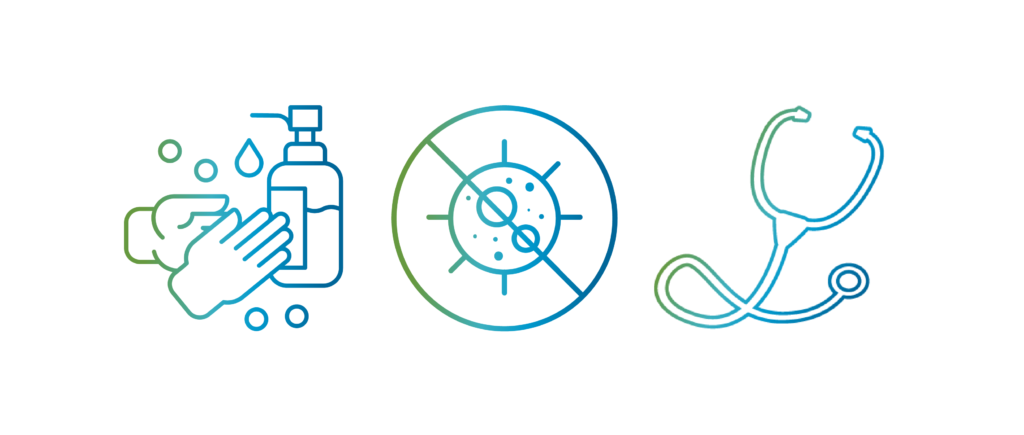March 2, 2020
Coronavirus (COVID-19): Keys to Prevention

You may be feeling concerned about coronavirus (also referred to as the illness caused by coronavirus, COVID-19), which has been in the news. If so, you’re not alone. Below is information is provided by the Centers for Disease Control and Prevention (CDC) and Kaiser Permanente.
Coronavirus (COVID-19) has infected some people in the United States, including in Oregon. For the general American public, who are unlikely to be exposed to the virus at this time, the immediate health risk from this coronavirus is considered low, the CDC said. This is because individual risk depends on exposure to the virus, which remains low. As such, current efforts are focused on preventing spread of the virus from person to person
We can all take steps to reduce the risk that the virus will spread. The same practices that stop the spread of the cold and flu also help prevent the spread of coronavirus (COVID-19). The following steps are recommended:
- Wash your hands often with soap and water for at least 20 seconds, especially after going to the bathroom; before eating; and after blowing your nose, coughing, or sneezing.
- If soap and water are not readily available, use an alcohol-based hand sanitizer with at least 60% alcohol. Always wash hands with soap and water if hands are visibly dirty.
- If you don’t wear a watch, consider singing the alphabet song twice to help track the time.
- Cover your cough or sneeze with a tissue, then throw the tissue in the trash. After this, wash your hands.
- Avoid touching your eyes, nose, and mouth.
- Avoid close contact with people who are sick.
- Clean and disinfect frequently touched objects and surfaces using a regular household cleaning spray or wipe. For example, wipe off surfaces and door handles between clients.
- Stay home when you are sick.
- Follow CDC’s recommendations for using a facemask.
- CDC does not recommend that people who are well wear a facemask to protect themselves from respiratory diseases, including COVID-19.
- Facemasks should be used by people who show symptoms of COVID-19 to help prevent the spread of the disease to others – particularly health workers and people who are taking care of someone in close settings (at home or in a health care facility). For example, offer a mask to a client who is coughing or showing other symptoms.
For information about handwashing, see CDC’s Handwashing website.
For information specific to healthcare, see CDC’s Hand Hygiene in Healthcare Settings.
CDC does have specific guidance for travelers.
Coronavirus (COVID-19) usually causes an upper respiratory tract illness like the common cold. Patients with this new coronavirus have had mild to severe respiratory illness with symptoms of fever, cough, and shortness of breath according to the CDC.
While there remains much to be learned about coronavirus (COVID-19), public health officials know that most people who contract it will suffer relatively minor symptoms. Roughly 80% of those who come down with coronavirus (COVID-19) will experience what might feel like a bad case of the flu: a fever, bad cough and shortness of breath. Another 15 to 18% might require more advanced care from a doctor or a stay in the hospital. Most infected people will recover on their own.
There is no specific treatment for coronavirus (COVID-19). If you or a family member have traveled recently to an area of risk, or if you think you may have been exposed to the virus and have symptoms of respiratory illness, you should call your primary care physician.
What is Cascadia doing?
Cascadia is working in parallel with Multnomah County and the Oregon Health Authority, as well as following CDC (Center for Disease Control) and WHO (World Health Organization) guidelines to protect our employees, clients, and community members. We take this outbreak very seriously.
Cascadia has an Incident Command Center Team – led by Chief Medical Officer Jeffrey Eisen – to ensure a consistent approach across the agency.
- We are insuring we have adequate supplies for prevention and preparedness.
- We have protocols in place for clients and colleagues with suspected signs or symptoms of flu or coronavirus.
- We have cleaning plans in place for each site, where sanitizing is happening multiple times throughout the day.
- We are limiting external access at our residential facilities for individuals with signs or symptoms of cold, flu, or coronavirus.
- We have plans in place to address absenteeism among our staff.
- We are reaching out to our most vulnerable community members — including those who are houseless, or have limited access to information and resources – to make sure they have trustworthy information.
3/5/2020 As you know Cascadia takes the health of our community very seriously. We host a variety of educational and training events open to the community and our employees throughout the Metro area. Per the CDC website, we’d like to recommend to all Cascadia event attendees that you please do not attend events if you are feeling ill. Avoid contact with anyone who is ill. Wash your hands frequently and thoroughly, and avoid touching potentially contaminated surfaces. While we love connecting at all of our events, you should also avoid shaking hands (a wave or a nod will be just fine!). We will have hand sanitizer and sanitizing wipes on hand at our events, and will prepare our general surfaces before and after the event.
